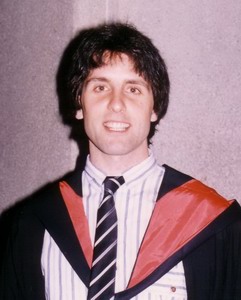

Home |
The Sparkling 12 |
A Scientist's Genesis |
Mars Constellations |
Electron Model |
Continent Formation |

Clean shaven and wearing the Applied Science gown at my graduation in 1988
I have always been fascinated with Science ever since I discovered that it existed. When I was a young boy I used to read Leonard De Vries' The Book Of Experiments to wile away the time and although I didn't actually perform many of the experiments I nonetheless absorbed most of the information. In particular I was fascinated with electricity and wanted to understand electronics. I was also fascinated with astronomy and space travel, as was my father, and I used to read his books on the subject. On the 21st of July (AEST), 1969 on a Tuesday afternoon, my entire primary school were assembled in the hall in front of a single black & white TV and there we watched as Neil Armstrong took the first human steps on the moon. Like most people I was amazed by this feat of human ingenuity and bravery and it lit a fire in me that has never died.
When I was 10 I tried to make a super heterodyne AM receiver, which didn't work, but it was my first taste of using a soldering iron. A few years later I wired up my bed head with various jacks and speakers which did work. Then my father and I installed a few power points around the house and I got my first few mains electric shocks. We were both amazed to find that the designers of power points were so stupid as to place the cable inlet directly in the path of the fastening screw so that any cable placed there would short out. Perhaps this was my first clear evidence of the astonishing incompetence of designers.
When I was 12 I built my first working audio amplifier from a kit. I improved on this effort once I discovered electric guitars by making a 100W guitar amp also from a kit. I also made speaker cabinets to go with these amps. When digital watches and portable calculators first came out I was amazed, like everyone else, and had to have one. This was the beginning of my life as an electronics geek which I continued through university and through the rest of my life.
I pursued a pure science course through years 11 and 12 as I loved science and couldn't imagine any university career in any other domain. In those days the science line was very popular and consisted of Pure Maths, Applied Maths, Physics, Chemistry and English. I had a natural affinity for Physics and passed the year 12 test at the end of year 11.
My life changed when I first saw an Apple 2E in 1983 and knew that computers were for me. I signed up to pursue an Applied Science degree at the Swinburne Institute Of Technology (now Swinburne University Of Technology) which I completed with distinction in 1988. I majored in Computers and Electronics but there were hefty slabs of other subjects in the course including, Chemistry, Human Anatomy, Maths and Nuclear Physics.
Although I did not end up pursuing a career in Science it has nonetheless remained with me and I have kept up an interest in various aspects of this tremendous human endeavour and I continue to be amazed and pleased with each new ground breaking innovation. I was applauding when they finally found the Higgs Boson, when they cloned Dolly the sheep, when they found the first gravity waves with LIGO, when we got sat navs on our phones, when they produced the first LED TVs, when solar panels became commonplace etc.
Most of all I have continued to be gobsmacked by all the astonishing achievements in Astronomy and space travel. Many people have no idea of the fantastic achievements of the Voyager missions but I certainly do! Humans may not have returned to the Moon since 1972 but our species has built and crewed the International Space Station, landed cars and a helicopter on Mars, sent satellites to Jupiter and Saturn, put a 2 huge telescopes in orbit, detected planets around most stars and sent spacecraft out of the solar system altogether. Wow! Such things were mere science fiction when I was born.
I have done a considerable amount of amateur astronomy with my old 3" refractor and trusty binoculars and have seen total eclipses of the sun and moon and photographed the sight. I have also invented my own system of constellations to replace the absurd and irrelevant naming system passed on to us by the ancient Mediterraneans.
No part of science is free of my interest and that goes for areas such as Geology, Psychology and Biology as well as the more obvious Physics & Chemistry.
I have included a link to "A Scientist's Genesis" here, even though it is a partly fictional retelling of the book of Genesis and includes many references to God. No it is not proper science canon! It's just a piece of fun that should be of interest to all scientists! Nevertheless, despite the God references, it DOES contain a great amount of detail on the story of creation that IS Science canon. Because of this I have included the link here. The work is actually under my "prose" section, so yes, I realise that it is partly fiction!